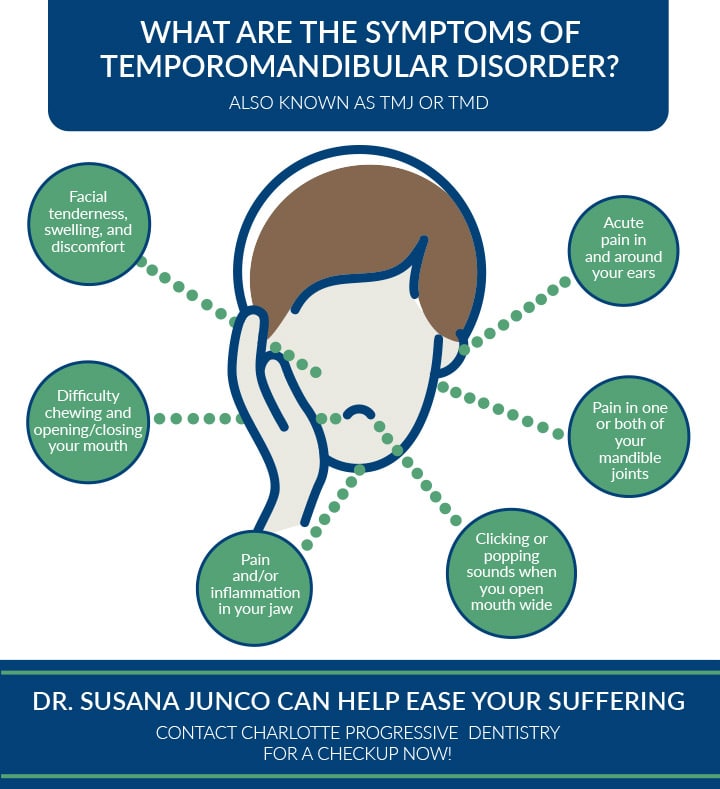Temporomandibular Joint Disorder
Temporomandibular Joint Disorder
At Charlotte Progressive Dentistry, we understand that the discomfort and disruption caused by TMD can significantly impact your daily life, and that’s why we’re here to offer comprehensive, cutting-edge solutions. Our dedicated team, led by skilled dentists Dr. Gregory Camp and Dr. Susana Junco, specializes in addressing the intricate complexities of TMD/TMJ in Charlotte, NC. With a commitment to precise diagnosis and tailored treatment plans, we aim to alleviate your symptoms and provide long-term relief and improved jaw health. Join us on a journey toward a life free from TMD-related discomfort, where your comfort and well-being are our top priorities.

What is TMD/TMJ?
Temporomandibular Joint Disorder, commonly known as TMD or TMJ, is a complex condition that affects the jaw joint and surrounding muscles. TMD can result in a wide range of symptoms, including jaw pain, headaches, earaches, facial discomfort, and difficulty opening or closing the mouth. If left untreated, TMD can significantly impact a person’s quality of life.
Understanding the Temporomandibular Joint
The Temporomandibular Joint (TMJ) is a remarkable and intricately designed structure that plays a vital role in your ability to open and close your lower jaw or mandible.
Complex Ligament System: Beneath your cheekbones lies an intricate network of ligaments connecting your lower jaw (mandible) to the lower part of your skull. These ligaments serve a dual purpose – facilitating smooth jaw movement and preventing jaw dislocation.
Articular Disc: Central to the TMJ mechanism is the articular disc, a small but vital component made of cartilage. This remarkable structure acts as a shock absorber, safeguarding your TMJ from the effects of sudden or excessive movement.
Cartilage-Covered Bone Points: The TMJ itself comprises two cartilage-covered bone points located at the top of the mandible. Intricately connected to the ligaments, these points are indispensable in maintaining the natural range of jaw movement and preventing deviations.
TMD Stressors and Symptoms
Stressors can take various forms, including physical injury, unusual jaw movements, or excessive pressure. When these stressors affect the TMJ, they disrupt its smooth operation.
Swelling Caused By Friction
The result of these stressors can be discomfort, pain, and swelling. The TMJ may start to rub against the lower part of the skull and the nerves in the vicinity. This friction leads to unpleasant sensations that signal something is amiss within your TMJ.
Difficulty Chewing and Opening/Closing Your Mouth
TMD/TMJ can manifest as difficulty chewing and a limited range of motion when opening or closing your mouth. This symptom can lead to discomfort and hinder your ability to enjoy meals and speak comfortably.
Inflammation in Your Jaw
Inflammation in the jaw is a common symptom of TMD/TMJ. It often accompanies pain and swelling around the temporomandibular joint, making simple tasks like talking and eating painful and uncomfortable.
Clicking or Popping Sounds
Clicking or popping sounds in the jaw joint are a hallmark sign of TMD. These noises occur during jaw movement and can be both audible and felt. They often indicate irregularities in the joint’s function and can be accompanied by discomfort.
Pain Around Your Mandible Joints and/or Around Your Ears
TMD/TMJ-related pain can manifest as aching or sharp discomfort in and around the jaw joints, typically in front of the ears. This pain can radiate to the surrounding areas, causing headaches and earaches, adding to the discomfort experienced by those with TMD.

Our Approach to TMD Treatment
At Charlotte Progressive Dentistry, our primary goal in TMD treatment is to provide long-term solutions that address the condition’s root cause. We understand that TMD is a multifaceted issue that requires a comprehensive evaluation and tailored treatment plan.
- Consultation: A thorough consultation is the first step in our TMD treatment process. During this consultation, our experienced dentist, Dr. Susana Junco will take the time to listen to your concerns, conduct a detailed examination, and review your medical history. We believe in understanding your unique situation to develop a personalized treatment plan.
- Imaging Prescription: To accurately diagnose and assess the severity of your TMD, we may prescribe advanced imaging techniques, such as Cone Beam Computed Tomography (CBCT) or Magnetic Resonance Imaging (MRI). These images provide valuable insights into the condition of your temporomandibular joint and surrounding structures.
- Orthotic Device: One of our primary approaches to TMD treatment involves using orthotic devices. These custom-made appliances support your jaw joint and relieve stress on the muscles and ligaments involved in jaw movement. Orthotics can help alleviate pain and discomfort and promote better jaw function.
- Platelet-Rich Fibrin (PRF) Injections: We sometimes recommend Platelet-Rich Fibrin (PRF) injections as part of your TMD treatment plan. PRF is derived from your blood and contains growth factors promoting tissue healing and regeneration. PRF injections can enhance the healing process in the jaw joint and surrounding tissues, accelerating your recovery.
- Trigger Point Injections: When the muscles around the face are overstimulated from clenching and grinding, we may offer injections with a small amount of anesthesia to provide immediate relief. Longer term relief can be accomplished in many cases when injections are done in more sessions.
- Braces for Long-Term Results: We may recommend braces as a longer-term solution, depending on the severity and complexity of your TMD. Braces can help correct misalignments of the teeth and jaws, providing stability and reducing the risk of TMD recurrence.
What Sets Our Treatments Apart
What differentiates Charlotte Progressive Dentistry from general dentists who do not treat TMD/TMJ, is our commitment to addressing the condition’s underlying causes rather than simply managing symptoms. While medications and nightguards prescribed by general dentists can offer temporary relief, our approach goes further:
- Diagnosing the Origin: We delve deep into the origins of your TMD, using advanced imaging techniques to identify the precise cause of your condition.
- Range of Treatment Options: Our comprehensive evaluation allows us to offer treatment options tailored to your specific needs. We don’t believe in one-size-fits-all solutions.
- Prevention and Healing: Our focus is treating the damage caused by TMD and preventing further problems. We aim to restore your jaw’s health and functionality, not just mask the symptoms.
- Long-Term Solutions: We prioritize long-term solutions that can provide lasting relief and improve oral health. Our combination of orthotic devices, PRF injections, trigger point injections and, if necessary, braces offers a holistic approach to TMD treatment.
TMD Treatment in Charlotte, NC
If you’re struggling with TMD/TMJ and seeking effective, long-lasting solutions, Charlotte Progressive Dentistry is here to help. Dr. Gregory Camp and Dr. Susana Junco are dedicated to providing personalized care and a comprehensive treatment plan to address your unique needs. Don’t let TMD hold you back from living a pain-free life; contact us today to schedule your consultation and take the first step toward lasting relief and improved jaw health.
